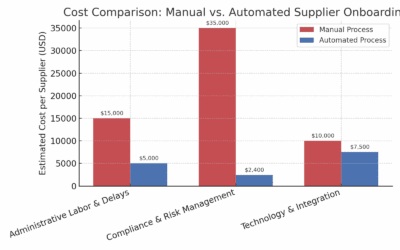Supplier onboarding is more than a formality; it’s the process that sets the tone for your relationship with a vendor. The difference between a...
READ MORELeanne Strickler
The Three Biggest Costs of Supplier Onboarding
by Leanne Strickler | Aug 8, 2025 | Articles, Supplier Onboarding
Supplier onboarding is a pivotal step in establishing a productive relationship with a new vendor. It’s where information is exchanged, compliance is verified, and systems...
A Comprehensive Guide to Vendor Onboarding Best Practices in 2025
by Leanne Strickler | Aug 8, 2025 | Articles, Supplier Onboarding
Key Takeaways Manual onboarding is expensive – It can cost more than $35,000 per supplier compared to less than $2,500 with automation. Early risk assessment is critical –...
Four Hidden Risks in Your Onboarding Workflow (And What You Might Be Losing)
by Leanne Strickler | Aug 8, 2025 | Articles, Supplier Onboarding
Manual onboarding processes can cost your organization millions of dollars, and you may not even realize it. Key Takeaways: Manual onboarding is costly – up to $35,000 per...
Five Signs Your Supplier Onboarding Process Needs a Refresh
by Leanne Strickler | Aug 8, 2025 | Articles, Supplier Onboarding, Supplier Relationship Management
Supplier onboarding is supposed to be a quick, reliable way to bring new partners into your supply chain, but too often, it’s more of a headache than a helper. Onboarding...
- SupplierGateway Launches Global Enhanced Digital Certification (EDC) for Suppliers
- Five Things Best-in-Class Supplier Onboarding Programs Have in Common
- The Three Biggest Costs of Supplier Onboarding
- A Comprehensive Guide to Vendor Onboarding Best Practices in 2025
- Four Hidden Risks in Your Onboarding Workflow (And What You Might Be Losing)













